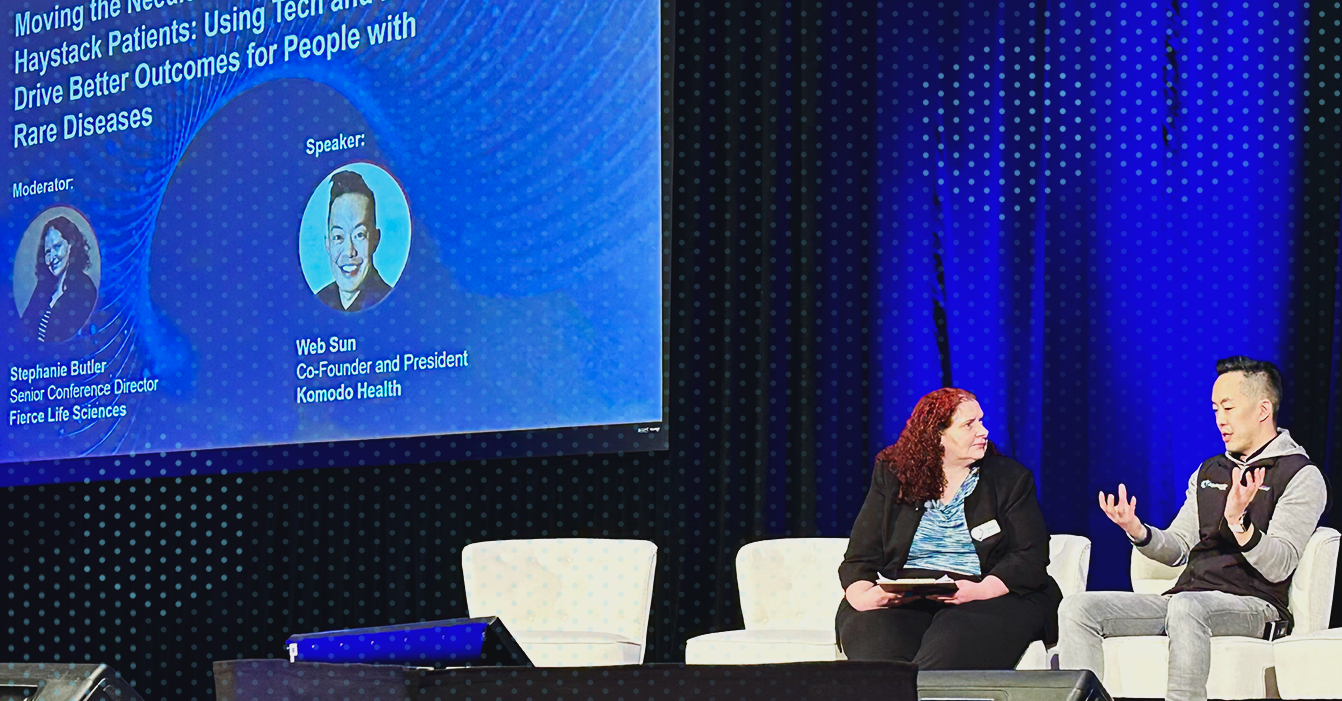Driving a New Paradigm of Progress for Rare Diseases

Web Sun, Co-Founder and President of Komodo Health, sat down for a fireside chat at Fierce JPM to discuss ways that machine learning and real-world data are driving unprecedented opportunities for patients, providers, researchers, and industry leaders working in the arena of rare disease.

There are few areas of healthcare as ripe for technology-driven change as the rare disease space. Patients with needle-in-a-haystack diseases wait an average of four years to receive a correct diagnosis, and their journeys typically involve misdiagnoses (nearly 75% of rare disease patients are initially misdiagnosed) and visits to multiple healthcare centers and myriad specialists before they find answers that fit. For those with ultra-rare diseases, a diagnosis often comes through luck when they encounter a provider familiar with their condition. Even then, next steps can remain unclear — more than 90% of rare diseases have no dedicated FDA-approved treatment.
The potential for impact is significant. With more than 7,000 diseases categorized as “rare,” as many as 1 in 10 Americans lives with one of these conditions. Policy-driven incentives like the Orphan Drug Act have been instrumental to past progress and will continue to be important, but today's transformation in the rare disease space is being driven primarily by new technology- and data-powered approaches.
To discuss how these new approaches are shaping the future of rare disease research, diagnosis, and treatment, Komodo Health™ Co-Founder and President Web Sun sat down with Stephanie Butler, Senior Conference Production Director of Fierce Life Sciences, for a fireside chat at the Fierce JPM event this week in San Francisco. Here are four highlights from their discussion:
Machine learning allows us to bypass the ICD code limitations that have long stymied progress for rare disease patients and providers.
One of the biggest challenges in the rare disease space is that most of these conditions do not have a designated ICD-10 code. In some cases, single codes are used for several conditions. Without a unique code, gathering information about a disease is difficult and creates massive gaps in our understanding of patient experiences, symptom patterns, effective treatments, and outcomes. By training technical models with a clinically informed set of diagnosis codes, causative factors, treatment journeys, and other standout factors, we can suddenly find patients that have previously been unidentifiable. We recently used this methodology to create a cohort of 370 patients with a very high likelihood of having aHUS, a complex and dangerous rare disease without an ICD-10 code. Once we’ve built a cohort, we can identify patient journey patterns that include treatments received, specialties of providers seen, reasons for ER visits, common comorbidities, demographics, common misdiagnoses, and more. This information creates opportunities to identify candidates for disease screening or to educate the healthcare providers responsible for making critical adjustments to disease management for these patients. On many levels, approaches like this will play an increasingly impactful role in identifying and closing gaps in care.
Comprehensive real-world data and machine learning approaches are driving a paradigm shift in the rare disease ecosystem.
Having removed traditional ICD code limitations, tools built on evidence drawn from real-world populations allow us to connect dots like never before. Clinically informed alerting systems help us identify undiagnosed, misdiagnosed, and at-risk patients, meaning patients can be treated earlier and more effectively. Key providers are identified and paired with the individual patients they are best suited to treat, delivering breakthrough medicines faster to the people who need them. A comprehensive, ground-level perspective also allows us to quickly gather patient journey data for a patient pool of five or 5,000, offering researchers new opportunities to deepen the understanding of a disease and treatment trajectory, and offering providers insights into peer approaches for those diseases that do not have established clinical guidelines.

New technologies are unlocking unprecedented potential in rare disease clinical trials.
With many rare diseases, traditional clinical trial processes are not feasible. Patient populations can be very small, and researchers are further limited by the challenges of identifying, recruiting, and retaining sufficient participants from such a small and dispersed pool of candidates. But with patient-level insight into a clinical population, operations leaders can pinpoint the HCPs and HCOs that are most likely to see patients with a particular rare disease. Life Sciences organizations can plan sites and protocols to best reach the specific patients of interest at the right moment in their journey, which speeds up recruitment and reduces overall cycle time. This option comes at the right time, as interest in decentralized clinical trials increases, bringing benefits for both the enterprise and patients.
Technology like Komodo’s is also transforming trial design with its capacity to create synthetic control arms. By using patient experiences drawn from real-world data to create patient control groups, this approach can make some research faster, less expensive, and more representative. In addition to being highly efficient, synthetic control arms can add a great deal of depth and breadth to research findings by supporting both retrospective observational insights and multiyear ongoing research into real-world patient experiences and outcomes. For rare diseases with especially complex patient journeys, the level of insight can be transformational in driving an improved standard of care.
New-era real-world data can support retrospective research that is more robust and efficient than ever before.
Beyond patient and provider identification, retrospective observational studies can be based entirely on real-world datasets like Komodo’s. We’ve done this with biotech companies such as Intercept, who compared clinical outcomes for different treatment regimes in patients with a rare liver disease, primary biliary cholangitis (PBC). Intercept ultimately demonstrated statistically significant improvement in event-free survival for PBC patients receiving its therapeutic and identified eligible patients for its trial — all without facing the feasibility hurdles of a traditional placebo-controlled clinical outcome study.

At Komodo Health, we are uniquely positioned to drive regulatory-grade insights for Life Sciences and other healthcare entities pursuing real-world research. The size and completeness of our foundational data asset and the power of our technology platform are unlocking these new approaches and more. Last year, we partnered with the Chan Zuckerberg Initiative’s Rare as One Network to provide our AI-powered platform to 50 member organizations working to close gaps in care for their rare disease patient populations. In the first year alone, we have seen many of these advocacy groups take advantage of our data-driven technology to more clearly identify patient cohorts, better understand the diagnostic odyssey for rare disease patients and how to shorten this journey, identify demographic disparities, and connect patients to appropriate healthcare providers and clinical researchers. We’ve supported rare disease initiatives with our Life Sciences partners as well as our academic research partners, including Stanford University’s Center for Population Health Sciences and the University of Maryland School of Pharmacy.
The industry is finally recognizing the massive opportunity unlocked by real-world data, including its capacity to drive innovation. The FDA recently issued updated guidance about the role of real-world evidence in regulatory decision-making, and a new coalition of European drug development organizations recently launched a moonshot program focused on rare disease — not dissimilar to President Biden’s Cancer Moonshot initiative, which Komodo Health supported with insights on colorectal cancer.
Rare disease is just one area being reshaped by new technology and data-driven approaches. We believe deeply in the power of insights and real world evidence to transform every aspect of healthcare. But we won’t do it alone — the scale of the challenge demands that we join forces to bolster the research ecosystem and tackle rare disease with a united front.
Read about  through our partnership with the Chan Zuckerberg Initiative, or hear the
through our partnership with the Chan Zuckerberg Initiative, or hear the  speech at last year’s World Orphan Drug Congress in Boston.
speech at last year’s World Orphan Drug Congress in Boston.
To see more articles like this, follow Komodo Health on Twitter, LinkedIn, or YouTube, and visit Insights on our website.




